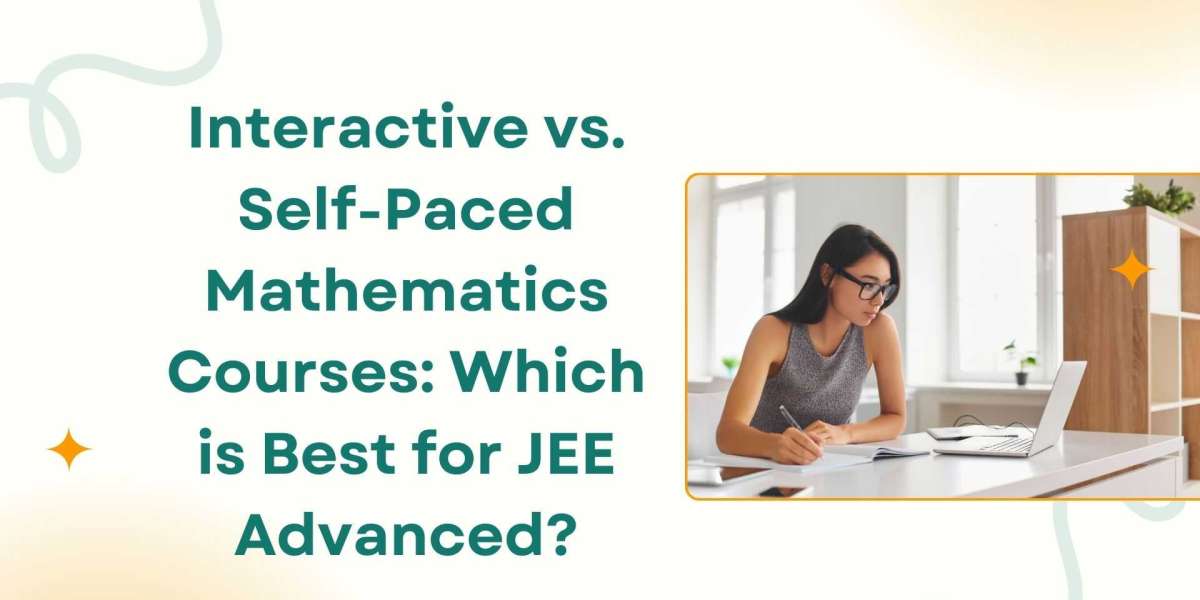Introduction
Preparing for the Joint Entrance Examination (JEE) Advanced requires a well-thought-out strategy, especially for a subject as challenging as Mathematics. One of the key decisions you'll need to make is choosing between interactive and self-paced mathematics courses. Both have their pros and cons, and the best choice depends on your individual learning style, schedule, and preparation goals. This article will help you weigh the options and make an informed decision.
Interactive Mathematics Courses
Pros:
- Real-Time Interaction:
- One of the main advantages of interactive courses is the ability to engage with instructors and peers in real-time and this helps in immediate feedback and clarification of doubts.
- Structured Learning:
- Interactive courses typically follow a fixed schedule, ensuring that you cover the entire syllabus in a systematic manner. This structure can help keep you disciplined and on track.
- Motivation and Accountability:
- Regular live classes create a sense of accountability and motivation, as you are part of a learning community with common goals.
- Active Participation:
- These courses often include interactive elements such as quizzes, polls, and group discussions, which can enhance your understanding and retention of concepts.
Cons:
- Fixed Schedule:
- The set timetable can be a disadvantage if you have a busy or unpredictable schedule. Missing live sessions may mean missing out on valuable learning opportunities.
- Limited Flexibility:
- Interactive courses may not provide the flexibility to revisit topics at your own pace. You might need to adjust your learning speed to match the course schedule.
Self-Paced Mathematics Courses
Pros:
- Flexibility:
- Self-paced courses allow you to learn at your own speed. This is ideal if you have other commitments or prefer to spend more time on difficult topics and less on areas you are already comfortable with.
- Convenient Access:
- These courses provide the convenience of accessing lectures and materials at any time, making it easier to fit study sessions into your personal schedule.
- Revisiting Materials:
- You can go back and review lectures and practice problems as many times as needed, which is particularly beneficial for mastering complex mathematical concepts.
- Personalized Learning:
- Self-paced learning allows you to tailor your study plan according to your strengths and weaknesses, focusing on areas that require more attention.
Cons:
- Lack of Real-Time Interaction:
- Without live interaction, you may miss out on immediate feedback and the ability to ask questions on the spot. This could lead to delays in clearing doubts.
- Self-Discipline Required:
- Success in self-paced courses requires a high degree of self-discipline and motivation. Without the structure of scheduled classes, it’s easy to procrastinate or fall behind.
- Limited Peer Interaction:
- Opportunities for engaging with fellow students are limited, which can result in a less collaborative learning experience.
Which is Best for JEE Advanced?
The best choice between interactive and self-paced mathematics courses for JEE Advanced depends on your personal preferences and circumstances. Here are some factors to consider:
- Learning Style: If you thrive in a structured environment with real-time interaction and immediate feedback, an interactive course may be more beneficial. Conversely, if you prefer flexibility and the ability to control your learning pace, a self-paced course might suit you better.
- Schedule: Consider your daily routine and other commitments. If you have a busy or irregular schedule, the flexibility of a self-paced course can help you balance your preparation with other responsibilities.
- Discipline and Motivation: Be honest about your level of self-discipline. If you are good at staying motivated and managing your time effectively, a self-paced course can be very effective. If you need external motivation and accountability, an interactive course may be more suitable.
- Support and Resources: Evaluate the support systems available in each type of course. Some self-paced courses offer forums or occasional live QA sessions, which can help mitigate the lack of immediate interaction.
Conclusion
Both interactive and self-paced mathematics courses have their own unique advantages and challenges. The best choice for JEE Advanced preparation ultimately depends on your individual learning style, schedule, and personal preferences. Consider your strengths, weaknesses, and the level of support you need to stay motivated and on track. Whichever type of course you choose, ensure that it offers comprehensive coverage of the syllabus, ample practice problems, and effective doubt-clearing mechanisms to maximize your chances of success in JEE Advanced.








